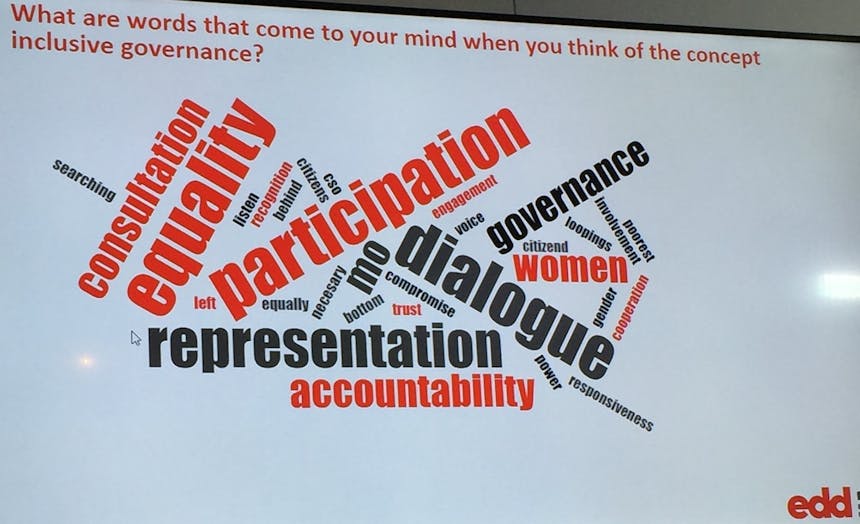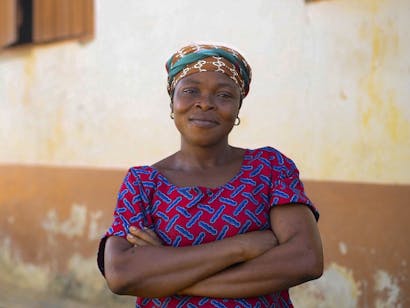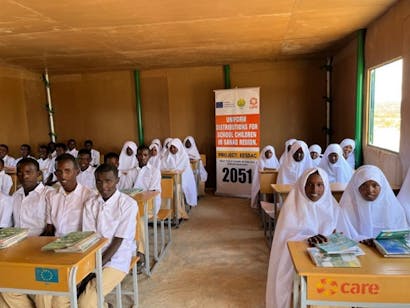Tackling power imbalances & promoting equalities
In a session at the European Development Days (EDD), development professionals took a look at how inclusive governance can play a role in minimising power imbalances with an eye toward tackling inequalities.

Why is it important to talk about power when we talk about (political) inequality?
In fragile and conflict affected settings, certain groups of people such as women and youth have been traditionally excluded due to discriminatory norms and practices, which are often shaped by unequal power relations. For example, in Burundi, women are dominantly viewed as weak and inferior compared to men, and young people in Somalia are perceived as indecisive and inexperienced. To be more critical, there are groups of women and youth that face an even harder time raising their voices, such as those experiencing poverty or other isolated groups.
Even when women are present, they often lack the ability to truly influence due to pervasive power imbalances.
In formal decision-making spaces, women’s voices remain a minority or (even when women have a strong presence in numbers in Parliament) their interests and needs remain unaddressed. This could be due to unwritten rules about upholding the clan or political parties’ own interests rather than representing the interests of grassroots women. The dominance of men over women in patriarchal societies, and the inequalities that are re-enforced as a result, are–without a doubt–an issue of power.
With these problems in mind, clearly power imbalance and its impact on inequalities was the huge elephant in the room.

So, what can we do?
CARE believes that creating and expanding spaces for dialogue between citizens (women and young people in particular) and power holders is core to promoting inclusive decision making. To paraphrase from a young female activist in Somalia, “We are not voiceless. You cannot deny us a space to dialogue and then call us voiceless. The local authorities need to give a space, and then they will hear what we have to say.”
Within three years of EVC implementation, initiating spaces for dialogue between citizens and local authorities has gained momentum, thanks in part to CARE’s Community Score Card model that has initiated safe spaces for dialogue on the importance of women’s inclusion in government planning in countries like Rwanda and Burundi. In Somalia, dialogue with clan elders paved way to shifting perceptions on the capabilities of young women and in getting young people elected in state parliaments.
It is important to note, however, that spaces for dialogue must take context and the full diaspora of women and youth into account. For example, the restrictions women and women’s rights organizations face in Pakistan differ from the civic space restrictions in Burundi, and the limitations women who are poor or disabled face may be more restrictive than those of elite women.

The single most important aspect of inclusive governance
In a poll of the audience during our EDD project lab session, most participants felt that the single most important aspect of inclusive governance is the opportunity for all citizens to become engaged, followed closely by holding authorities accountable to the needs of citizens. But one thing was clear by the end of the session: promoting citizen voice is about exercising their power. We must challenge power head-on and give voice to citizens who are often not heard—particularly women and youth—to advance the SDG 16+ agenda.
This blog was based on the session ‘Every voice counts: Fighting inequalities by working on inclusive governance’, organized by CARE Nederland in collaboration with CARE International EU, The Hague Academy, and DEVCO, during the 2019 European Development Days in Brussels, Belgium (June 18-19).
Check out bit.ly/EDDEVC for our resources.


